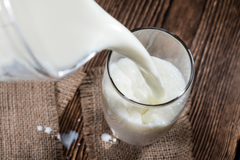Constipation on a Carnivore Diet: Causes, Prevention, and Solutions

Following a high-protein, high-fat carnivore diet, which focuses exclusively on animal products and excludes carbohydrates, can lead to benefits, including weight loss and improvements in blood sugar and gastrointestinal issues. However, because the carnivore diet lacks fiber from plant foods, a common "carnivore flu" symptom that can arise is constipation.
Below, we'll cover the causes of constipation among carnivore dieters as well as strategies for managing this side effect and getting your digestion back on track.
What Is Constipation?
Constipation, a common digestive issue, refers to infrequent bowel movements or difficulty passing stools. Not only can constipation cause discomfort and bloating, but if it's chronic, it can sometimes lead to more serious health risks.
Common Symptoms of Constipation
If the following criteria apply to you, you're most likely dealing with constipation:
-
Having fewer than three bowel movements per week
-
Passing hard, dry, or lumpy stools
-
Straining during bowel movements
-
Feeling like you have "incomplete evacuation" when passing bowel movements
You might also have an upset stomach, bloating, cramps, and loss of appetite when constipated.
Potential Health Risks Associated With Chronic Constipation
Constipation is more than just inconvenient and uncomfortable. It's important to have regular bowel movements in order to remove waste from your body and to maintain a healthy digestive system.
When you're frequently constipated, or if you experience symptoms of Irritable bowel syndrome while on the carnivore diet (such as loose stools, bloating, and constipation), you're at greater risk for experiencing issues like:
-
Hemorrhoids: Swollen veins in the lower rectum and anus, often caused by increased pressure during bowel movements.
-
Anal fissures: Small tears in the lining of the anus that can occur when passing hard or large stools.
-
Fecal impaction: A serious condition where hard, dry stool becomes stuck in the rectum and cannot be expelled.
-
Intestinal blockages: An obstruction in the intestine that prevents food or liquid from passing through, which can cause pain and other symptoms.
Causes of Constipation on a Carnivore Diet
The carnivore diet exclusively focuses on meat, organ meats, fish, eggs, and other animal products, all of which are high in protein but do not contain fiber.
Fiber is considered an important element that aids in digestive health, particularly by adding bulk to stools and helping with bowel movements and elimination. Given that the carnivore diet lacks fiber, which most people are accustomed to eating at least in small or moderate amounts, it's not surprising that research shows some people are prone to experiencing constipation while eating the carnivore diet, especially at first.
On the other hand, there's some evidence that low fiber intake is not actually the main reason that people are constipated. For example, one study found that many people who are constipated do in fact eat enough fiber and not less than those who aren't constipated.
Similarly, another study found that factors like consumption of sugary products, lots of sodium, dehydration, and higher calorie intake were correlated with higher constipation, but a lack of fiber, fruits, and veggies was not.
Factors That Can Cause Constipation:
Aside from low intake of fiber, here are other reasons why constipation is a common side effect of the carnivore diet and other low-carb diets, such as the keto diet:
-
Lack of variety: A limited diet can mean missing out on certain nutrients that support the digestive system, such as minerals like magnesium and a balance of healthy fats.
-
Sudden change in diet: Rapidly switching to a meat-only diet can temporarily "shock" your digestive system, leading to slowed bowel movements. It takes time for your body to adjust to a higher protein and fat intake and much fewer carbs, which is why side effects associated with the carnivore diet and keto diet are most common in the first few weeks.
-
Dehydration: Adequate fluid intake is crucial for stool passage since water helps to hydrate the gastrointestinal tract and make it easier to pass stool. A very low-carb, high-protein diet increases the need for more fluids, as your body typically loses more urine when in ketosis and digesting lots of protein. Not drinking enough water while following the carnivore diet can lead to dehydration and harder stools.
-
Electrolyte imbalances: An imbalance in minerals like magnesium, which is a natural laxative, can contribute to constipation. Other electrolytes are also needed to contribute to proper hydration, including sodium, which helps regulate fluid balance and nerve and muscle function in the body, as well as potassium, another electrolyte that assists in muscle contractions and helps maintain normal digestive function.
How to Avoid Constipation on a Carnivore Diet
To prevent constipation while following a carnivore diet, follow these steps:
-
Gradually transition to the carnivore diet: Slowly reducing your carbohydrate intake and increasing your meat consumption can help your digestive system adjust more smoothly. Give yourself several weeks to switch over to a very low-carb diet in order to ease side effects.
-
Stay hydrated: Drink plenty of water daily to help soften stools and facilitate easier bowel movements. Carry around a water bottle with you to make sure you're regularly drinking throughout the day—just be sure to avoid sugary drinks.
-
Consume electrolyte-rich foods: Among the best sources of minerals, including electrolytes, are bone broth, eggs, and fatty fish like salmon. Here's a list of animal-based foods that are great natural sources of essential vitamins and minerals:
-
Fish: Fish like salmon, sardines, and mackerel are rich in potassium and sodium and also provide magnesium and calcium. These fish are especially beneficial due to their high omega-3 fatty acid content, which helps to support healthy responses to inflammation, as well as healthy blood pressure and cholesterol.
-
Bone broth: Bone broth is excellent for electrolytes like magnesium, calcium, and potassium, which is why it's a staple in many carnivore diets. It’s made by simmering bones and connective tissue, which leeches these minerals into the broth.
-
Red meats: Beef, lamb, and pork are good sources of potassium and phosphorus. They also contain smaller amounts of magnesium and sodium, which can help balance electrolyte levels.
-
Organs: Organ meats, such as liver, heart, and kidney, are some of the most nutrient-dense foods available. Liver is particularly high in potassium and phosphorus and provides some sodium and magnesium.
-
Shellfish: Foods like oysters, clams, and mussels are excellent sources of sodium and also provide potassium, magnesium, and calcium. These are particularly useful for balancing electrolyte levels.
-
Eggs: High-quality eggs, especially the yolks, contain sodium, potassium, and magnesium. Eggs are a versatile addition to a carnivore diet and help ensure a more complete intake of essential nutrients.
-
Dairy: For those who include dairy in their carnivore diet, products like cheese and heavy cream are good sources of calcium and can also provide sodium and potassium.
-
Incorporate organ meats for nutrient diversity: As mentioned above, organ meats are rich in vitamins and amino acids that can support overall digestive health. If you prefer not to cook organ meats, you can take them in convenient capsule form instead, such as by supplementing with beef liver or Grass Fed Beef Organs. A blend of beef organs provides powerful nutrients like preformed vitamin A, vitamin B12, coenzyme Q10, bioavailable heme iron, and selenium that help to nourish your gut, digestive system, and beyond.
-
Considering supplementation: If necessary, supplements like probiotics, magnesium, and other electrolytes can be used to aid in digestive health and bowel movements. Colostrum and collagen, taken in either powder or capsule form, are also beneficial for increasing your intake of various amino acids and other compounds that support a healthy microbiome.
How to Deal With Constipation on a Carnivore Diet (Once It’s Already Happened)
If you find yourself constipated after transitioning to a carnivore diet, these tips can help to alleviate your symptoms:
-
Drink more water: Often, simply drinking more water can relieve constipation. For even greater effects, try adding electrolytes to your water, such as in dropper or powder form; just be sure they don't contain sugar.
-
Consume coffee or tea: While not compliant with a strict carnivore diet, these beverages can stimulate the digestive system and help to promote bowel movements.
-
Get regular exercise: Exercise helps increase intestinal activity and move things through the digestive tract more quickly. If you're struggling with bloating and lack of appetite, exercise often helps with those symptoms, too.
-
Natural laxative remedies: Occasionally, natural laxatives like aloe vera or senna can be effective. These are best used only occasionally to avoid your body forming a dependence on them. Magnesium can also function as a natural laxative, such as when you take it before bed, and can be taken long-term in most cases.
-
Add in small amounts of low-carb, fibrous vegetables: If strictly adhering to a carnivore diet isn't a must and is not working well for you, try following a more moderate approach instead that includes a bit more fiber and carbohydrates. Introduce small amounts of fibrous vegetables like spinach or kale to provide fiber and electrolytes.
Conclusion: How to Handle Constipation on a Carnivore Diet
While the carnivore diet is often helpful for promoting weight loss and managing gastrointestinal issues, it can potentially cause side effects like constipation, especially in the early stages of the diet. Strategies like drinking plenty of water, consuming more electrolytes, and even adding in small amounts of vegetables can help decrease digestive discomfort. Always listen to your body and make necessary adjustments to be sure your diet supports your overall health.











